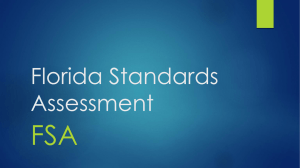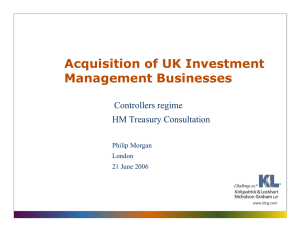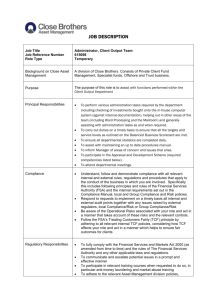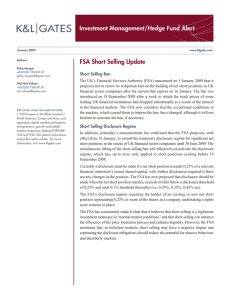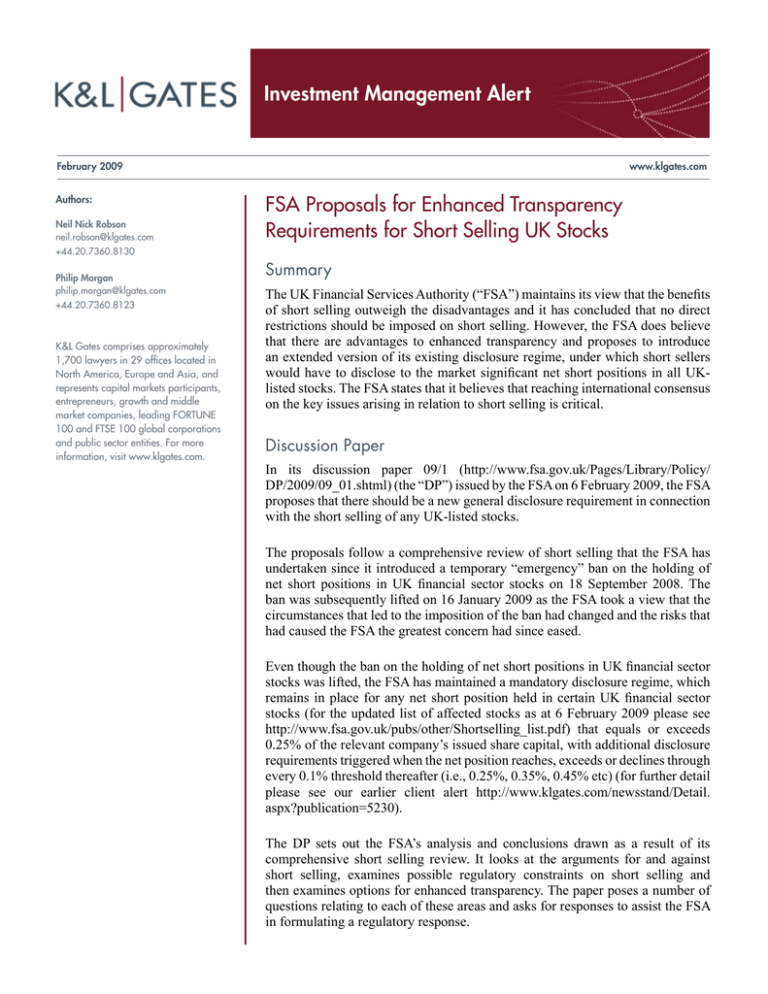
Investment Management Alert
February 2009
Authors:
Neil Nick Robson
neil.robson@klgates.com
www.klgates.com
FSA Proposals for Enhanced Transparency
Requirements for Short Selling UK Stocks
+44.20.7360.8130
Philip Morgan
philip.morgan@klgates.com
+44.20.7360.8123
K&L Gates comprises approximately
1,700 lawyers in 29 offices located in
North America, Europe and Asia, and
represents capital markets participants,
entrepreneurs, growth and middle
market companies, leading FORTUNE
100 and FTSE 100 global corporations
and public sector entities. For more
information, visit www.klgates.com.
Summary
The UK Financial Services Authority (“FSA”) maintains its view that the benefits
of short selling outweigh the disadvantages and it has concluded that no direct
restrictions should be imposed on short selling. However, the FSA does believe
that there are advantages to enhanced transparency and proposes to introduce
an extended version of its existing disclosure regime, under which short sellers
would have to disclose to the market significant net short positions in all UKlisted stocks. The FSA states that it believes that reaching international consensus
on the key issues arising in relation to short selling is critical.
Discussion Paper
In its discussion paper 09/1 (http://www.fsa.gov.uk/Pages/Library/Policy/
DP/2009/09_01.shtml) (the “DP”) issued by the FSA on 6 February 2009, the FSA
proposes that there should be a new general disclosure requirement in connection
with the short selling of any UK-listed stocks.
The proposals follow a comprehensive review of short selling that the FSA has
undertaken since it introduced a temporary “emergency” ban on the holding of
net short positions in UK financial sector stocks on 18 September 2008. The
ban was subsequently lifted on 16 January 2009 as the FSA took a view that the
circumstances that led to the imposition of the ban had changed and the risks that
had caused the FSA the greatest concern had since eased.
Even though the ban on the holding of net short positions in UK financial sector
stocks was lifted, the FSA has maintained a mandatory disclosure regime, which
remains in place for any net short position held in certain UK financial sector
stocks (for the updated list of affected stocks as at 6 February 2009 please see
http://www.fsa.gov.uk/pubs/other/Shortselling_list.pdf) that equals or exceeds
0.25% of the relevant company’s issued share capital, with additional disclosure
requirements triggered when the net position reaches, exceeds or declines through
every 0.1% threshold thereafter (i.e., 0.25%, 0.35%, 0.45% etc) (for further detail
please see our earlier client alert http://www.klgates.com/newsstand/Detail.
aspx?publication=5230).
The DP sets out the FSA’s analysis and conclusions drawn as a result of its
comprehensive short selling review. It looks at the arguments for and against
short selling, examines possible regulatory constraints on short selling and
then examines options for enhanced transparency. The paper poses a number of
questions relating to each of these areas and asks for responses to assist the FSA
in formulating a regulatory response.
Investment Management Alert
Benefits of Short Selling
The FSA believes that the benefits of short
selling, such as price efficiency and liquidity,
both of which contribute to the efficient
functioning of the market, normally outweigh the
disadvantages. Other benefits are discussed, for
example the ability for short selling to increase
trading volumes and reduce transaction costs
through a reduction in bid/ offer spreads. As a
result, the FSA proposes that there should be
no direct restrictions on short selling. The FSA
has consistently made it clear that it considers
short selling a legitimate investment technique in
“normal” market conditions.
Disadvantages of Short Selling
While the FSA considers that short selling
has its benefits, the FSA believes, as it sets
out in the DP, that it can also lead to potential
problems, especially in times of extreme market
turbulence:
● Market abuse – Short selling can create
misleading signals about the supply or the
correct valuation of a specific stock and in
conjunction with ‘scaremongering’ tactics it
can push down the price of a stock being
shorted.
● R
ights issues – The FSA believes that a
company undertaking a rights issue is
vulnerable because there is an incentive
for short sellers to try to drive down the
share price below the rights issue price so
they can profit from the short selling and
increase the supply of shares available from
the underwriter, thereby making it easier
for them to close out their positions. Where
a company is undertaking a rights issue to
raise funds to underpin its operations (rather
than to finance expansion), the negative
impact of short selling on a company’s share
price can contribute to the downward spiral
of confidence in the company.
● D
isorderly markets – An excess of short
selling in one particular stock can suggest to
the markets that a firm is overvalued. Where
investors overreact by selling their stock enmasse, the price decline may be excessive
and precipitate the collapse of the issuer’s
stock price. The FSA notes that where this
strategy, which can reap substantial profits
for short sellers, is widespread in the stocks
of a particular sector, for example banking,
short selling can have a “contagion effect” and
result in disorderly markets across that sector
with the potential for the collapse of the share
price and of the companies generally.
● T
ransparency deficiencies – The FSA states
in the DP that information asymmetries
between informed short sellers and
uninformed market participants could result
in price inefficiency and information about
the aggregate short position in a single stock
could help the market to judge the extent to
which short selling drives the price of that
particular stock. In addition, the FSA notes
that information about the significant short
positions held by individual investors could
be beneficial to the market as it would be
public knowledge as to who is driving the
trading in that stock.
● S ettlement issues – The FSA states that
naked short selling gives rise to a risk that
the seller is unable to deliver stock to the
buyer — i.e., a risk of settlement failure,
which can impair the proper functioning of
the market and result in sub-optimal levels
of trading.
Regulatory Options – Short Selling
Prohibition or Enhanced Disclosure
In the DP, the FSA considers each of the options
open to it, including various options for a complete
or partial ban (for example, prohibiting all naked
short selling); however, the FSA comments that
it does not believe that “any direct constraints on
short selling are currently justified”. The FSA
will continue to monitor the markets and stands
ready to reintroduce the prohibition on short
selling whenever it deems that this is warranted.
February 2009 | 2
Investment Management Alert
The FSA sees advantages in having enhanced
transparency of short selling. Short selling can,
as noted above, convey a signal to the markets
that a stock is overvalued. If investors act
appropriately on this signal, they will improve
the accuracy of the valuation of the stock, so the
disclosure of short positions can therefore play
an important role in the price formation process.
The FSA believes that there is some appetite
among market participants for a greater level of
transparency regarding short positions in stocks
and it adds that a requirement to disclose short
positions held could partially address some of the
issues associated with abusive short selling — for
example, it would help to detect market abuse.
The FSA believes, on balance, that “the
benefits of disclosure obligations outweigh
the costs” of implementing such a disclosure
regime. The FSA has considered two disclosure
regimes — one being the disclosure of aggregate
short positions in a particular security and the
other being the disclosure of individual short
positions. This second regime is consistent with
the FSA’s Disclosure and Transparency Rules
(“DTR”), which already require the disclosure
of significant shareholdings in listed companies.
The DP contains detailed reasoning as to why
this DTR-style regime is most appropriate for the
UK and assesses what the disclosure threshold
should be — the proposal being that disclosure
requirements for “significant” short positions
should be introduced for all UK listed stocks —
with “significant” being defined in the DP’s
proposal as a net short position of 0.5% of the
relevant company’s issued share capital (as
last announced).
The FSA View in Context
Regulators around the globe have put in place a
variety of different measures in connection with
short selling. The International Organization
of Securities Commissions (which the SEC
organised and in which it and the FSA are leading
participants) and the Committee of European
Securities Regulators both have working groups
on short selling, the latter of which is headed-up
by the FSA. The FSA believes that international
consensus on the key issues is extremely important
and it is actively contributing to the work of both
groups, supported by its findings from the review
that led to the DP. The FSA has not yet set out
a detailed blueprint for a disclosure regime but
will use feedback from this DP to inform the
international debate.
Sally Dewar, managing director of wholesale
and institutional markets at the FSA, said: “This
discussion paper offers the opportunity for
market participants and others to contribute to
the development of future policy. We believe that
enhanced disclosure across the whole market is
the right way forward. We also consider it to be
important that we align our proposals with those
being developed on an international basis and we
are working towards this.”
Timing
The FSA’s consultation period closes on 8 May
2009, after which the FSA will issue a formal
Feedback Statement setting out its conclusions
on a longer term policy for short selling.
If you require further advice or information on
the issues considered in this client alert please do
not hesitate to contact the authors or your regular
contact(s) at K&L Gates.
K&L Gates comprises multiple affiliated partnerships: a limited liability partnership with the full name K&L Gates LLP qualified in Delaware and
maintaining offices throughout the U.S., in Berlin and Frankfurt, Germany, in Beijing (K&L Gates LLP Beijing Representative Office), and in
Shanghai (K&L Gates LLP Shanghai Representative Office); a limited liability partnership (also named K&L Gates LLP) incorporated in England and
maintaining our London and Paris offices; a Taiwan general partnership (K&L Gates) which practices from our Taipei office; and a Hong Kong
general partnership (K&L Gates, Solicitors) which practices from our Hong Kong office. K&L Gates maintains appropriate registrations in the
jurisdictions in which its offices are located. A list of the partners in each entity is available for inspection at any K&L Gates office.
This publication is for informational purposes and does not contain or convey legal advice. The information herein should not be used or relied
upon in regard to any particular facts or circumstances without first consulting a lawyer.
©2009 K&L Gates LLP. All Rights Reserved.
February 2009 | 3


